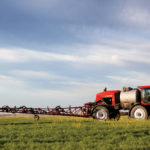Reading Time: 4 minutes Pollinators and beekeepers on the Prairies have a new champion — the first-ever research chair concentrating on the health of these essential workers in fields and pastures. “I’ll be focused on improving honeybee health to improve sustainable agriculture,” said Dr. Sarah Wood, an associate professor of veterinary pathology at the University of Saskatchewan’s Western College […] Read more

Neonicotinoids, reducing bee mortality are priorities for new research chair
Bees produce billions in benefits for Prairie farmers but they face a host of challenges

Neonic-treated canola not an ‘unacceptable risk’ for pollinators
Already facing federally mandated phase-outs from many major on-farm uses in Canada over risks to aquatic insects, neonicotinoids aren’t expected to pose “unacceptable risks” to pollinators when used on canola seed or hothouse vegetables in the meantime. Health Canada said as much Thursday as it released its final re-evaluation decisions for three neonic pesticides — […] Read more

Neonic phase-out may limit flea beetle control tools
CNS Canada — The phasing out of neonicotinoid seed treatments in Canada may cause problems for the country’s canola growers when dealing with flea beetles — but alternatives pesticides could fill the gap. Health Canada’s Pest Management Regulatory Agency (PMRA) is proposing that two neonicotinoid pesticides, clothianidin and thiamethoxam, be phased out over the next […] Read more

Phase-outs planned for clothianidin, thiamethoxam
The remaining two of the big three neonicotinoid insecticides will be phased out of nearly all on-farm use in Canada in the next few years under a proposal from Health Canada’s Pest Management Regulatory Agency. PMRA officials on Wednesday announced 90-day consultation periods on its decisions for both clothianidin and thiamethoxam, following “special reviews” which […] Read more

Germany plans to toughen conditions for insecticide use
Berlin | Reuters — Germany plans to make it more difficult for farmers to use crop insecticides in a bid to preserve biodiversity, an environment ministry document showed. “Insect biomass has fallen by more than 75 per cent in the last 27 years in Germany,” according to the paper seen by Reuters on Wednesday, saying […] Read more

EU nations back ban on all outdoor neonic use
Brussels | Reuters — European Union countries backed a proposal on Friday to ban all use outdoors of insecticides known as neonicotinoids that studies have shown can harm bees. The ban, championed by environmental activists, covers the use of three active substances — imidacloprid, developed by Bayer CropScience; clothianidin, developed by Takeda Chemical Industries and […] Read more

Two neonics set for three-year extensions on registration
Health Canada’s pesticide regulator proposes to allow continued registration for two members of the neonicotinoid family of pesticides, both of which are under heavy scrutiny for their effects on bees and other pollinators. The Pest Management Regulatory Agency on Tuesday issued proposed decisions on clothianidin and thiamethoxam that would extend the products’ existing conditional registrations […] Read more

Pesticide rules hurting farmers, says consultant
Producers north of the border have access to fewer modes of action and active ingredients
Reading Time: 4 minutes Canadian farmers are losing much-needed pest management products to red tape. “We’re losing products faster than we’re bringing them in,” said Ron Pidskalny, an Edmonton-based consultant with a background in herbicide development and agronomy. “We’re in a situation where we’re actually ending up with fewer active ingredients than we had before. “The tool box is […] Read more

French court suspends pesticides over potential harm to bees
Paris | Reuters — A French court suspended on Friday the licence for two pesticides made by Dow Chemical, citing uncertainty over environmental risks including their effects on bees. The preliminary ruling by an administrative court in the city of Nice overturned a decision by France’s health and environment agency ANSES in September to grant […] Read more

Data mining finds no honeybee colony risk from correct neonic use
An expedition through published and unpublished studies on neonicotinoid pesticides has led a Guelph research team to find no colony-level risk to honeybees from the seed treatments — if they’re correctly used. The University of Guelph team, led by toxicologist Keith Solomon and adjunct professor Gladys Stephenson, analyzed 64 papers from “open, peer-reviewed literature” on […] Read more

